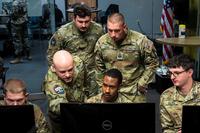Soldiers who turn to crowdfunding websites to solve COVID-19-related financial troubles may end up breaking Army standards of conduct, according to an Army legal expert.
The novel coronavirus pandemic has caused economic hardship to spread across the country, prompting businesses to cut back and unemployment to rise. Soldiers are still getting paid, but spouses may not be so lucky.
Related: Record-Breaking Unemployment Signals Hard Times Ahead for Veterans
That's why the Army recently put out a reminder to soldiers that they should stay away from crowdsourcing sites like GoFundMe or Kickstarter as a quick way to raise money.
"It is problematic for soldiers to solicit funds or gifts on crowdsourcing platforms," John Kent, associate deputy general counsel at the Army Office of General Counsel, told Military.com.
For starters, soldiers are not allowed to use their status as a member of the U.S. Army to solicit money for themselves or someone they know, Kent said. They cannot accept money from "prohibited sources," such as most defense contractors or 501(c)(3) charitable organizations.
This means it's usually a bad idea to work with crowdsourcing sites that typically don't give out this information, Kent said.
"It's difficult or problematic and sometimes you can't even ... identify who [is] actually making the donations on those crowdsourcing solicitations that go out," Kent said.
"You've got this base rule that precludes you from accepting gifts based on your status as a soldier ... when you crowdsource, you are going to get donations from lots of people and if you are identified as a soldier, we are going to tell you, 'hey, you probably can't accept that.'"
The same rules apply if a neighbor sets up a crowdsourcing fundraiser for a soldier who is suffering from financial troubles, Kent said.
"It's still going to be a problem, because when the sergeant comes to us and says, 'hey, look someone started a GoFundMe thing, and they are offering me $5,000,'" Kent said. "We would have to dig into it ... how did they identify themselves? Show us the crowdsourcing solicitation. What do they say?
"And if they say 'hey, help an Army [noncommissioned officer] out. He's going through financial troubles; his wife has been laid off because of COVID-19. Send your money in his name.' ... "Well, we would say it looks to me like you have tied your affiliation to the U.S. Army to the solicitation."
The rules, however, can be different if soldiers are trying to help each other in troubled times, Kent said.
"There are rules that cover the solicitation of donations or seeking of funds ... amongst federal employees," he said. "You cannot solicit a contribution for an official superior or accept a gift from an employee receiving less pay."
In general, federal employees cannot solicit money for another federal employee, nor can they accept money in that situation, but there are exceptions known as "a special and infrequent occasion," Kent said.
"Let's say the specialist's wife had gotten sick and the family was going through some hard times," Kent said. "There is an exception that would allow federal employees to donate money to help that specialist because of his family's situation based on that exception."
There was a case in Virginia that involved an Army captain's house being destroyed by a falling tree during a storm, Kent said.
"The question I got was, can we have a collection among the people in this directorate to help this captain out based on what has happened. And yeah, you can accept food, clothing and whatnot, to include cash, because it meets this exception of special and infrequent occasion. We can allow an NCO to contribute to a captain under that specific exclusion," Kent said.
If soldiers are uncertain about the rules, they should talk to a government attorney who deals with ethical issues, Kent said.
"We are always happy to try to get the rules out there and explain to people how things work," Kent said. "We don't want you to spin your wheels and do something where you have to give it back, but there also may be ways you can do it, and we'd like to work that out for you in advance."
Matthew Cox can be reached at matthew.cox@military.com.
Read More: F-15 Skids to a Stop During Emergency Landing at Andrews












